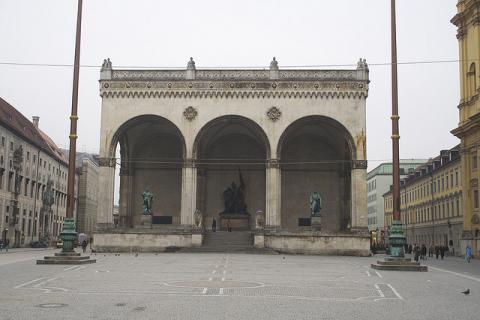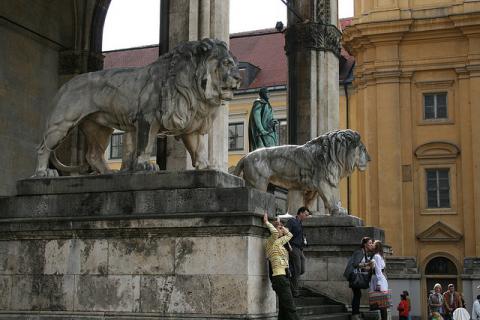ODEONSPLATZ: The Rise of an Unknown
Zuerst magazine interviews Werner Bräuninger
December 2011
Translated by Wilhelm Kriessmann
Biography of Werner Bräuninger
 Werner Bräuninger, born 1965, is a freelancing publicist and essayist. His book Odeonsplatz: The Rise of an Unknown (Universiras 2011) describing Hitler's life from 1890 to 1935 caused a sensation. His book, Hitlers Adversaries in the NSDAP (Herbig 2004), about the imminent opposition in the National Socialist state, as well as his work about the spiritual roots of Count Claus von Stauffenberg within the circle around the poet Stefan George, were controversially discussed.
Werner Bräuninger, born 1965, is a freelancing publicist and essayist. His book Odeonsplatz: The Rise of an Unknown (Universiras 2011) describing Hitler's life from 1890 to 1935 caused a sensation. His book, Hitlers Adversaries in the NSDAP (Herbig 2004), about the imminent opposition in the National Socialist state, as well as his work about the spiritual roots of Count Claus von Stauffenberg within the circle around the poet Stefan George, were controversially discussed.
Bräuninger’s publications have drawn attention from the FAZ, Die Welt and the renowned Zeitschrift fuer Geschichtswissenschaft (Science of History magazine). His website is www.marmorklippen.de
* * *
Feldherrnhalle on Odeonsplatz, Munich

Zuerst: Mr. Bräuninger, your new book Odeonsplatz might cause a small revolution in the German book market—a book about Hitler which has neither his name in the title nor his picture. Does it not really mean “Hitler sells?”
B: It is, as you say, obviously a revolution because we do not live in normal times. From Norbert Knopp, we naturally could have expected a title like “Hitler`s German Shepherd Dogs.” My intention was a quite different one.
Z: Which?
B: That interchangeable relationship between the symbol-heavy architecture of the Odeonsplatz and the Feldherrnhalle in Munich, which in Hitler’s life had a rather symbolic significance, and his comet-like rise to a world-historic personality. Adolf Hitler’s rise until 1935 I quasi-built around this strange relationship. Hardly anyone understood that my book is an extended essay—otherwise I would have titled it scientifically, “Hitler, a biography”…..
Z: Why does your book end in 1935?
B: Odeonsplatz was to a certain extent the overture, with Feldherrnhalle the crescendo.
Z: There are many published books on the Internet that have already reported a lot about Hitler’s roots and his youth, many legends. Why is that?
B: The major problem is that for quite awhile in typical Guttenberg manner (referring to Guttenberg’s plagarism), one (writer) copied the other and thus all the errors and mistakes were carried on. The courage of an individual analysis and judgment is missing. Joachim Fest was at least an outstanding stylist—what followed him? At best, the painstaking work of the British historian Ian Kershaw. Since then no serious, cohesive work about Hitler has been published. There certainly exist in the meantime good, detailed treatises about different questions on the theme of Nationalsozialismus, but political correctness seems to be the point of order there. For such mentalities, the personality and character of Hitler will always be unreachable; Hitler’s characterological study is more important than to know of the ideas which resulted from his character.
Z: Several interpretations exist to explain how the inmate of the Viennese homeless shelter could become Germany’s strongest man.
B: … and unfortunately as many stupid answers. The blasé attitude of several historians and their un-historic, self-constructed dogmas and doctrines just could not accept that a young man without a name, without a school graduation, without a profession, protectionism, and means, just by self-thought or by a sheer boundless Wille Zur Macht accomplished it. Hitler is therefore for many either a tool of Wall Street or a willing instrument of Big Industry. “In spite of his 24 years, he intellectually outdid us all,” admitted a member of the Viennese men’s home long before Hitler’s seizure of power. Vienna was the school for his life. The image of the Canaille Mensch nearly turned him more than once into a misanthrope. With this experience he later was ahead of nearly all his political competitors. The homeless shelter and the men’s home, the sorrow and need he knew there, the deep abyss for the common man he saw there. Nothing was strange for him after that, the hard elbow tactics, the merciless advantage-taking, cheating and treason, often criminal energy, the herd instinct, but also sometimes an unexpected solidarity of the declassed. (It became) an invaluable advantage. No Gustav von Kahr, no Alfred Hugenberg and no Franz von Papen—but also no Edouard Daladier, Winston Churchill or Franklin D. Roosevelt, and not at all a Carl Goerdeler or Erwin, conspirators of 20th July 1944—knew the soul of their people as well as Hitler did.
Z: In the last months, Hitler’s role in WWI has been very much the topic of historians. The German historian Thomas Weber describes in his book Hitler’s First War that Hitler was a “coward.” Can one maintain such a thesis?
B: A “coward” who on August 2, 1914 sings the German hymn with great enthusiasm in front of the Feldherrnhalle? Who, as an Austrian citizen voluntarily joins the German army the next day? Who immediately fought at the West front, volunteered for the very dangerous messenger runs, relieving married men. Fighting in 87 battles—Wytschaete, Becelaere, the Yser and at Ypern, Arras and the Somme, the many close-range skirmishes in Flanders, received the EK I (Iron Cross First Class) and the black “purple heart” with swords. All this is spotlessly documented in Hitler’s military papers. Cowards I define differently.
Z: If the facts are so obvious, why does Weber then write such a book?
B: For people of his couleur, the dead Fuehrer serves as a welcome occasion to “scientifically” work off one’s own neuroses and deficiencies. One can accept it rather calmly when one reads the thank you notes at Weber`s book; he recruits his supporting troops from the Wall Street Journal to the Provincial Archive of the Bavarian Capuchin. History will bypass him as it will the absurd theories of Professor Lothar Machtan, who wanted to make Hitler into a latent homosexual, or those questionable theories by Daniel Goldhagen. They have all so justly disappeared in that orbit.
Z: Why did the Munich Odeonsplatz have this important value in Hitler’s life?

Close up of Feldherrnhalle Lions
B: My treatise describes Hitler’s strong tie with that beautiful area between the Theatiner Church and the Hofgarten in the heart of Munich. He stood there already as a young art student with his easel. Here is where he heard the announcement of the 1914 mobilization, and where his 1923 putsch collapsed. Lastly, here occurred the “Rise of The Unknown,” the subtitle of my book. As the new head of the German government, he could, after a truly triumphal drive through Munich in March 1933, for the first time commemorate, during a big demonstration in front of the Feldherrnhalle, the deaths from the collapsed revolt and the victory of his party, and at the same time pronounce the beginning of a new turning point. It seems as if this location was for Hitler a center of strength, drawing new inspirations to him again and again. Regularly he was exposed at this place to death and triumph, bliss, intoxicating life-will and the transitory deeds of mankind. In 1937, he here honored the deceased General Ludendorff and bid farewell to the eight innocent victims of Georg Elsner’s assassination attempt at the Buergerbrau Keller. Amidst Goebbels’ “Total War,” leaflets of the anti-regime underground group “White Rose” were posted at the Feldherrnhalle, the Holy Grail of the NSDAP; here also the mourning column for the dead Gauleiter Wagner marched by; and finally the 7th US army took possession, April 30th 1945, exactly at the same hour that Hitler took his life in the bunker in Berlin. A mystification, too.
Z: Down to a basic question: Who was Adolf Hitler?
B: Well, I too can hardly give you a definite answer. In our traditional history, we do not know of a similar personality. Somehow, totally different from his contemporaries, like a stranded meteor in the cosmos, he was a synthesis of a sensitive artist with an extremely radical politician—inspired and driven by a power of the will without example. At the same time, he was by his own right an uncommon modernizer, social reformer and futurist; otherwise, also the personified anachronism whose world fantasies were partly in the 19th century, already gone by. Hitler was as Nietzsche said on one occasion: “…from the day before and the day after.” I remember standing at the Odeonsplatz after I finished the two books asking myself if I came close to the man with whom I was for decades so closely involved, with his thinking, his doing, his feelings, his deeds and misdeeds.
Z: And did you?
B: Very difficult to answer because even if at first I wanted to believe that I had, yet I suspected that he became even more unknown to me than before. “An eternal riddle I will remain, for me and the others” the Bavarian ‘fairy tale’ King Ludwig II once wrote as a self-characterization. It seems that with Adolf Hitler we face a similar situation. A mystery remains 65 years after his death. And a question which the friend of his youth, August Kubizek, who shared for a few months a very shabby room in Vienna with the late Chancellor, asked early on—namely: “What did God want to do with this human being?”
Z: In the “personal epilogue” of your book, you write that you did not want to do either an “un-reflected apology or glorification” or a “total condemnation” of the phenomenal Hitler. What is the status in the Bundes Republik of Germany today for a historiography that is objective and totally based on documented facts?
B: Rarely does it happen in history that a man like Adolf Hitler, convinced to have been chosen by destiny, faces at the end of his life the ruins of all that which he wanted to build. 1945 ended his dream of the Third Reich. This is the verdict in nearly all the publications about him. There are a few treatises which, on the other hand, argue for his canonization. Both aspects do not do any justice to an objective and historically valued examination of the leader of the National Socialists. As so often, my work occupies a position between left and right; I am used to it. For the “hard-core right” I am suspect because I do not gloss over the crimes committed during the NS regime and see, for instance, Stauffenberg as a man who wanted to save his Reich, however questionable his means might have been. For the conservatives of the old school my writing is not reactionary enough and for the established Frankfurter Allgemeine Zeitung editorial page, I am anyway a persona non grata.
Z: In the last years above all, an increasing “Hitler Mania” takes place on the German TV…
B: I am surprised to see how the standard of the TV documentaries sinks deeper and deeper, how facts are twisted, historical developments and events are stupidly treated with platitudes and often falsified on purpose. Hitler is seen as “the absolute evil.”

These are elements of a medieval inquisition and should be alien to the enlightened 21st century. How about dropping the dogmatic blinders for a change and present to the Germans the so-multi faceted, contradictory personality of the Fuehrer who, in a Faustian sense, was also a human being? Exactly this I have tried to accomplish with my publications. Adolf Hitler will remain the authentic figure and chapter of the past century. Quite a time will pass, however, until one can dare to also look at one’s own history, freely and openly, in Germany.
Category
Adolf Hitler, European History, Germany- Printer-friendly version
- 7591 reads









